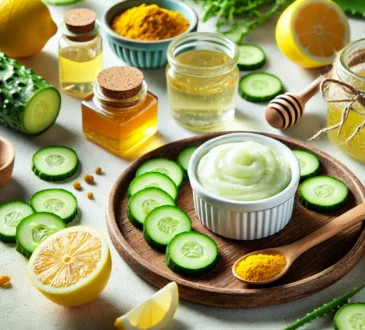
Here are ten tips for making a homemade skin toner:
- Witch Hazel and Rose Water Toner:
- Mix equal parts witch hazel and rose water for a gentle and balancing toner.
2. Green Tea Toner:
- Brew green tea, let it cool, and use it as a toner. It’s rich in antioxidants and can help soothe the skin.
3. Apple Cider Vinegar Toner:
- Dilute apple cider vinegar with water (usually 1 part vinegar to 3 parts water) to create an astringent toner that can help balance the skin’s pH.
4. Cucumber and Aloe Vera Toner:
- Blend cucumber with aloe vera gel and strain to create a refreshing and hydrating toner.
5. Lavender and Chamomile Toner:
- Infuse dried lavender and chamomile flowers in hot water, strain, and use the infused water as a soothing toner.
6. Lemon Juice Toner:
- Dilute fresh lemon juice with water (1 part lemon juice to 3 parts water) for a brightening and clarifying toner.
7. Mint and Green Tea Toner:
- Infuse fresh mint leaves in green tea, let it cool, and use it as a refreshing toner.
8. Honey and Tea Tree Oil Toner:
- Mix honey, tea tree oil, and water for an antibacterial toner that can help combat acne.
9. Rice Water Toner:
- Rinse uncooked rice with water, collect the strained water, and use it as a brightening and hydrating toner.
10. Aloe Vera and Lavender Toner:
- Combine aloe vera gel with a few drops of lavender essential oil for a soothing and calming toner.
Important Tips:
- Patch Test: Before using any homemade toner, perform a patch test on a small area of your skin to check for any allergic reactions or irritations.
- Proper Storage: Store homemade toners in clean, airtight containers in a cool, dark place to extend their shelf life.
- Refrigeration: Some homemade toners, especially those with perishable ingredients like cucumber or aloe vera, may benefit from refrigeration.
- Avoid Harsh Ingredients: Be cautious with ingredients like lemon juice or vinegar, as they can be too acidic for some skin types. Always dilute them properly.
- Monitor Skin Reactions: Pay attention to how your skin responds to the toner. Discontinue use if you experience any discomfort or adverse reactions.
- Consistency is Key: For visible results, use your homemade toner consistently as part of your skincare routine.
Remember, everyone’s skin is different, so what works for one person may not work for another. It’s important to tailor your skincare routine to your specific needs and consult with a dermatologist if you have any concerns about your skin.




